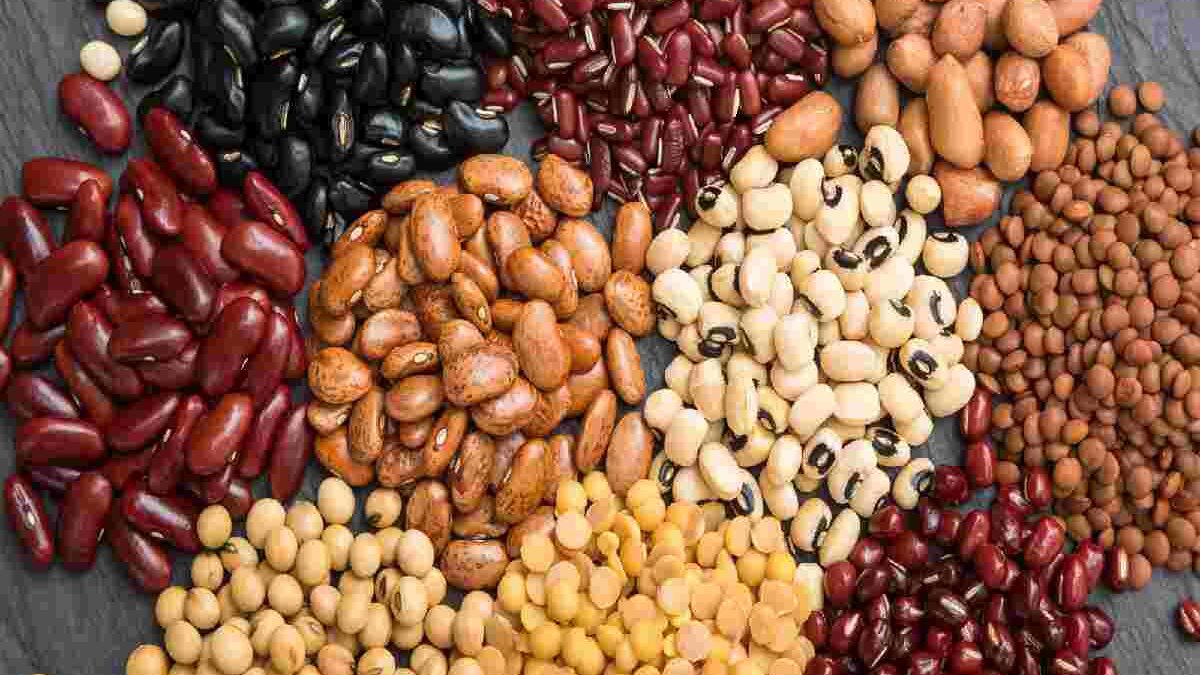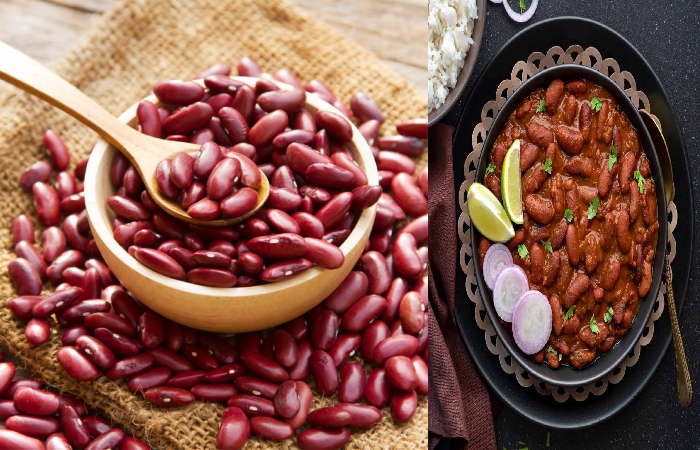Table of Contents
Kidney Beans Nutrition – Explanation
Kidney beans nutrition are inexpensive and versatile, and they provide substantial nutritional and health benefits. Adding kidney beans to your meals is an easy way to boost protein and fibre intake without a lot of calories. While red kidney beans are most common, you can find white, purple, and even striped kidney beans to perk up your plate.
Health problems like vomit, diarrhoea can show up if you consume more raw and uncooked rajma in the form of salads or curry. According to a journal published in Epidemiology and infections, consuming beans in raw and uncooked form is very harmful.
Kidney Bean Nutrition Facts and Health Benefits
The USDA provides the following nutrition information for 1/2 cup (90g) of red kidney beans cooked with no added salt or fat. Including kidney beans, which nutrition researchers have studied for years. They are commonly consumed, inexpensive, and widely grown around the world. Research suggests that increasing your intake of beans provides certain health benefits.
Calories: 113.5
Fat: 0.5g
Sodium: 198mg
Carbohydrates: 20g
Fibber: 6.7g
Sugars: 0.3g
Protein: 7.8g
Carbs
Kidney beans are a low-calorie food that provides a healthy dose of complex carbohydrates. There are three types of carbohydrates in kidney beans.
Most of the carbohydrates in kidney beans come from starch. Starches provide the body with quick energy. Kidney beans also have a small amount of naturally occurring sugar.
Fats
There is less than one gram of fat in a half-cup serving of kidney beans, making them a naturally low-fat food. Most of that small amount of fat is healthy polyunsaturated and monounsaturated fat.
Protein
Each half-cup serving of kidney beans provides nearly 8 grams of plant protein. For this reason, many vegans and vegetarians use kidney beans or other types of legumes to boost their protein intake.
However, kidney beans are not a complete protein. Complete proteins provide all of the essential amino acids that the body cannot make and therefore must be in the diet. You’ll also need to be sure to eat whole grains or seeds to get all essential amino acids.
Vitamins and Minerals in Kidney beans nutrition
A 100-gram (just over half a cup) serving of cooked kidney beans contains 33% of your daily needs of folate. The same serving also provides thiamine (11% of your daily needs) and smaller amounts of vitamin K (10%), vitamin B6 (6%), vitamin C, riboflavin, niacin, and pantothenic acid. This B vitamin helps boost red blood cell production and provides other health benefits.
Aids Healthy Weight Management with Kidney beans nutrition
An evaluation of the nutritional value of legumes published in Obesity Reviews determined that “replacing energy-dense foods with legumes has been shown to have beneficial effects on the prevention and management of obesity and related disorders, such as cardiovascular disease, diabetes, and the metabolic syndrome.”5 Study authors suggest replacing high-calorie, high-fat meaty foods (such as burgers and sausage) with beans or combining a smaller portion of meat with legumes when cooking these foods to reduce fat and calorie content.
Lowers Cholesterol of Kidney Bean
A review published by the Canadian Medical Association Journal found that including beans in your diet helps to lower LDL cholesterol.
Improves Blood Sugar Control with Kidney beans nutrition
Another review of studies found that increasing intake of beans, peas, and lentils can help people with and without diabetes improve long-term glycaemic control in their diets.
Supports Beneficial Bacteria of Kidney Bean
The fibre and resistant starch in kidney beans act as prebiotics, feeding the friendly bacteria in the gut. This improves digestive health and may even help prevent some cancers.
Allergies
Although allergies to kidney beans are relatively rare, it is a legume and therefore botanically related to significant allergens such as peanut and soy. In particular, people who are allergic to peanuts, pigeon peas, or chickpeas may be sensitive to kidney beans as well.9
Symptoms of a legume allergy may include swelling in the face, difficulty breathing, severe asthma, abdominal pain, nausea, or vomiting. If you suspect that you or your child has an allergy to kidney beans or any legume, speak with your healthcare provider to receive a diagnosis and advice on managing the condition.
Varieties of Kidney Bean Nutrition
Kidney beans are a variety of common beans (Phaseolus vulgaris) and can come in many colours (white, black, red, or purple) and patterns (spotted, striped, and mottled). Kidney beans are commonly purchased canned or dried (in bulk or bags).
Some canned varieties of kidney beans are high in sodium. When buying canned kidney beans, check the label and look for brands that do not contain added salt. Or cook your own dried beans at home. Dry cooked kidney beans are very low in sodium, at less than 200mg per half-cup serving.
Kidney Beans Nutrition of Side Effects
Red kidney beans, a common addition to bean chilli and other dishes, is a nutritious vegetable full of protein, carbohydrates, vitamins and minerals. Despite this, there are health risks associated with eating them. Understanding those risks can help you appropriately incorporate kidney beans into your diet without harming your health.
Digestive and Bowel Problems
You need 25 g to 38 g of fibre each day for the best health, although your needs decrease as you get older. A 1-cup serving of red kidney beans contains 13.1 g of fibre. If you eat many red kidney beans or eat a typical serving in a diet already high in fibre, this may cause problems with your digestion and bowel health. These problems include gas, abdominal pain, diarrhoea and blocked intestines.
High Cholesterol
specific facts backing up the claim that bean pod extracts do lower cholesterol levels in the blood of people suffering from obesity are acknowledged
Cancer Risk
The folate in red kidney beans — each 1-cup serving providing 230 mcg of this vitamin — is generally considered beneficial; it may help decrease some congenital disabilities. Getting too much folate may cause health problems, though.
You need 400 mcg of folate each day. A study published in a 2009 issue of “The Journal of American Medical Association” indicates that study participants with heart disease who took 0.8 mg of folate each day along with other vitamins demonstrated a higher risk for cancer.
Obesity
One case is incredibly familiar to experts circles, and that is the case of two studies whose results, unfortunately, did not match. One of those studies discovered that consuming a particular extract produced from a bean pod can increase and boost the loss of the excessive.
Weight in people who were only moderately overweight – 6 pounds, unlike those who did not include bean pod in their daily diet. On the other hand, i.e. in the second study, persons who were already obese did not ward off any excess weight after eating bean pods during eight weeks of testing.
Organ Damage
Including red kidney beans in your diet provides you with iron — 5.2 mg per cup, which helps meet your daily needs of 8 to 18 mg each day. However, too much iron can be dangerous, so carefully monitor your diet to ensure the kidney beans you consume do not introduce an excess of iron into your diet. Iron overload may trigger heart and brain damage, resulting in strokes or heart attacks.
Surgery
Bean pod might affect blood sugar levels. There is some concern that it might interfere with blood sugar control during and after surgery. Stop taking bean pod at least two weeks before a scheduled surgery.
Conclusion
Kidney beans have a mild, creamy, nutty flavour that makes them easy to add to any dish. If you have a favourite soup, stew, or salad recipe, toss in a handful of the beans to add flavour and nutrition. Also, if you have a kidney bean recipe and are out of the beans, it is easy to substitute pinto beans or black beans.
Rajma, also known as kidney beans, are very harmful and even poisonous if properly. They are more dangerous when cooked at a temperature less than 100 degrees Celsius.
And it also contains a toxin Phytohemagglutinin which is poisonous and is found in many beans but has a higher concentration in kidney beans. Even 4 to 5 uncooked beans can make you ill.


